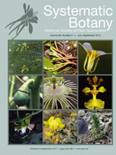
SYSTEMATIC BOTANY
metrics 2024
Elevating Knowledge in Plant Biodiversity
Introduction
Systematic Botany, published by the American Society of Plant Taxonomists, is an esteemed journal focusing on the diverse fields of plant taxonomy, systematics, and evolution. With an ISSN of 0363-6445 and an E-ISSN of 1548-2324, this journal serves as a critical platform for researchers aiming to advance our understanding of plant biodiversity and evolutionary relationships. Operating since 1994, Systematic Botany has garnered significant recognition, achieving a Q2 ranking in Ecology, Evolution, Behavior and Systematics, and Plant Science categories, and ranking within the top half of Scopus for Genetics. The journal prioritizes publishing high-quality, peer-reviewed research, making it an essential resource for academics, practitioners, and students alike. Although it does not provide open access options, the journal's robust reputation in both American and international botanical research speaks to its pivotal role in disseminating vital scientific knowledge in the field. For those interested in the latest advancements in plant science, Systematic Botany is indispensable.
Metrics 2024
 0.49
0.49 0.90
0.90 1.10
1.10 82
82Metrics History
Rank 2024
Scopus
IF (Web Of Science)
JCI (Web Of Science)
Quartile History
Similar Journals
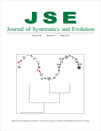
Journal of Systematics and Evolution
Advancing the Frontiers of Ecology and EvolutionThe Journal of Systematics and Evolution, published by WILEY, is a premier academic journal dedicated to advancing the fields of Ecology, Evolution, Behavior, and Systematics and Plant Science. With a distinguished Q1 ranking in both of these critical categories in 2023, it stands at the forefront of scientific research, placing it in the top quartile among its peers. Featuring both an ISSN of 1674-4918 and an E-ISSN of 1759-6831, the journal has been converging innovative research since its inception in 2008. The journal caters to a global audience of researchers, professionals, and students, providing a platform for disseminating significant findings and fostering academic dialogue. Its impressive Scopus rankings further affirm its impact, coming in at Rank #62/721 in Ecology and Rank #48/516 in Plant Science, highlighting its relevance and influence in these vibrant fields. As an open-access journal, it ensures that groundbreaking research is accessible to all, thus enhancing collaborative opportunities within the scientific community.
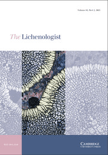
LICHENOLOGIST
Empowering Ecological Understanding through LichenologyLICHENOLOGIST is a prestigious journal published by Cambridge University Press, dedicated to advancing the field of lichenology and promoting a deeper understanding of the ecology, evolution, and systematics of lichens. Established in 1958 and focusing on the convergence of research through 2024, this journal has established itself as a significant resource within the Q2 category of Ecology, Evolution, Behavior and Systematics. With a Scopus ranking of #316 out of 721 in its field, it highlights research that not only enhances academic knowledge but also has practical implications for ecology and conservation efforts globally. Although traditionally not an open-access journal, it provides valuable insights and contributes to the scientific community by disseminating high-quality, peer-reviewed research. LICHENOLOGIST is essential for researchers, professionals, and students looking to stay informed about the latest advancements in lichen studies, making it an indispensable resource for anyone involved in ecological and biological sciences.
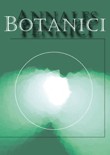
ANNALES BOTANICI FENNICI
Illuminating Research in Botany Since 1973ANNALES BOTANICI FENNICI, published by the Finnish Zoological Botanical Publishing Board, is a distinguished journal that has served as a vital platform for advancing research in the fields of Ecology and Plant Science since its inception. With an ISSN of 0003-3847 and an E-ISSN of 1797-2442, this journal has established a reputation as a Q3 category publication in both Ecology, Evolution, Behavior and Systematics, and Plant Science as of 2023. Although it presently does not offer open access options, the journal remains a cornerstone in the dissemination of important research findings and methodologies pertinent to these scientific domains. By promoting high-quality research, ANNALES BOTANICI FENNICI not only contributes to scholarly discourse but also enriches the academic community in Finland and beyond. Researchers, professionals, and students are encouraged to explore its archives, engaging with a wealth of knowledge that spans over four decades, from 1973 to 2023, thereby enhancing their understanding and furthering their studies in botany and ecology.
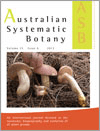
AUSTRALIAN SYSTEMATIC BOTANY
Charting the Future of Australian Plant ResearchAustralian Systematic Botany is a prestigious academic journal dedicated to the field of plant science, published by CSIRO PUBLISHING. Established in 1988, this journal has become a vital resource for researchers, professionals, and students focusing on the systematic study of Australian flora. With an impressive track record and convergence extending to 2024, it operates in the Q3 category for Ecology, Evolution, Behavior and Systematics and Q2 for Plant Science as of 2023. The journal holds significant value in the academic community, given its Scopus ranking, which places it in the 61st and 59th percentiles within its respective categories. Although it follows a subscription-based model, the journal remains committed to advancing knowledge in systematic botany, offering critical insights that shape the future of ecological and biological research both in Australia and globally.
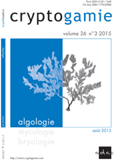
CRYPTOGAMIE ALGOLOGIE
Bridging Disciplines for a Sustainable Future in Aquatic ScienceCRYPTOGAMIE ALGOLOGIE, with ISSN 0181-1568 and E-ISSN 1776-0984, is a prominent scholarly journal published by ADAC-CRYPTOGAMIE in France, focusing on the intricate intersection of aquatic sciences, ecology, evolution, and plant sciences. Established in 1990, this journal serves as a vital platform for researchers, professionals, and students alike, fostering the dissemination of innovative research and comprehensive reviews in its field. With a Q3 ranking in Aquatic Science, Ecology, Evolution, Behavior and Systematics, and Plant Science for 2023, CRYPTOGAMIE ALGOLOGIE stands out for its contributions to understanding cryptogams' ecological significance and their evolutionary adaptations. The journal is indexed in Scopus, reflecting its impact and relevance in the scientific community, with particular strengths highlighted by ranks in various categories. As an engaging resource for those involved in aquatic ecosystems and plant ecology, CRYPTOGAMIE ALGOLOGIE invites submissions that push the boundaries of knowledge in these crucial fields, ensuring methodologies and findings are accessible and impactful for future research.
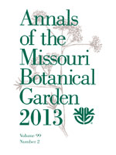
ANNALS OF THE MISSOURI BOTANICAL GARDEN
Championing Research for a Greener TomorrowANNALS OF THE MISSOURI BOTANICAL GARDEN is a prestigious, peer-reviewed journal published by the Missouri Botanical Garden, focusing on the rich disciplines of Ecology, Evolution, Behavior, and Plant Science. With a storied history dating back to 1946, this journal has evolved to become a significant platform for scholars and professionals to disseminate research that informs global understanding of plant biology and conservation. Ranked in the Q2 category for both Ecology and Plant Science in 2023, it boasts commendable standings within the Scopus rankings, placing it in the 66th percentile for Plant Science and the 65th percentile for Ecology, Evolution, Behavior, and Systematics. The journal's commitment to rigorous scientific standards ensures that it remains a vital resource for those seeking to explore vital ecological and botanical research. As a product of the esteemed Missouri Botanical Garden, the journal serves researchers, professionals, and students alike, encouraging collaboration and innovation in the plant sciences community.

KOREAN JOURNAL OF PLANT TAXONOMY
Shaping the future of plant sciences through impactful research.Korean Journal of Plant Taxonomy, published by the Korean Society of Plant Taxonomists, serves as a pivotal platform for researchers and professionals in the fields of plant taxonomy and ecology. With an ISSN of 1225-8318 and a burgeoning E-ISSN of 2466-1546, this journal aims to disseminate high-quality research that contributes to our understanding of plant species diversity, classification, and evolution. Spanning the years from 2018 to 2024, the journal finds its niche within Q3 rankings in both Ecology, Evolution, Behavior and Systematics and Plant Science, reflecting its impactful contributions and relevance in the academic community. The journal's scope encompasses various studies aimed at advancing plant taxonomy in South Korea and globally. By fostering collaboration and sharing groundbreaking research, the Korean Journal of Plant Taxonomy plays a crucial role in shaping the discourse in plant sciences, making it an invaluable resource for students, researchers, and professionals alike, committed to advancing knowledge in this dynamic field.
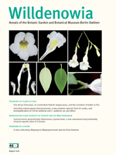
Willdenowia
Connecting researchers to the heart of botanical science.Willdenowia is a prestigious scientific journal published by the Botanischer Garten & Botanische Museum Berlin-Dahlem, dedicated to advancing the field of botany and plant sciences. With an ISSN of 0511-9618, this journal has established itself as a crucial platform for researchers, practitioners, and students interested in ecology, evolution, behavior, systematics, and plant science. The journal boasts an impactful reputation, evidenced by its impressive Q1 and Q2 quartile rankings in Plant Science and Ecology, Evolution, Behavior and Systematics respectively, as well as notable Scopus rankings, placing it within the top quartiles of its categories. Although access is not open, articles published in Willdenowia contribute significantly to the global body of botanical research, making it an essential resource for anyone looking to deepen their understanding of plant biology and related ecological disciplines. The journal has continuously evolved since its inception and aims to facilitate interdisciplinary collaboration and knowledge dissemination in the life sciences.
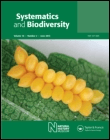
SYSTEMATICS AND BIODIVERSITY
Advancing the frontiers of ecological and evolutionary research.Systematics and Biodiversity, published by Taylor & Francis Ltd, is a prominent academic journal that provides a vital platform for advancing research in the fields of ecology, evolution, and plant science. With an ISSN of 1477-2000 and an E-ISSN of 1478-0933, the journal has established itself as a reputable source of scholarly information since its inception in 2003, and continues to publish cutting-edge studies through 2024. Recognized for its rigorous peer-review process, it holds a prestigious position in academic circles, reflected by its Q2 ranking in Ecology, Evolution, Behavior and Systematics and Q1 ranking in Plant Science as of 2023. The journal's contributions are further characterized by its strong performance in Scopus rankings, placing it in the 69th and 68th percentiles in its respective categories. Researchers, professionals, and students alike will find invaluable insights and innovative methodologies within its pages, making Systematics and Biodiversity an essential resource for those dedicated to understanding the complexities of biological diversity and systematics. The journal's impact factors and commitment to high-quality research underscore its significance in shaping the future of ecological and botanical studies.
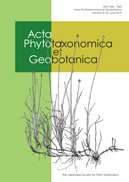
Acta Phytotaxonomica et Geobotanica
Unveiling the Secrets of Plant TaxonomyActa Phytotaxonomica et Geobotanica, published by the Japanese Society for Plant Systematics at the University of Tokyo, serves as a vital platform for advancing research in the fields of ecology, plant science, and biodiversity. With an ISSN of 1346-7565 and an E-ISSN of 2189-7042, this journal not only provides a comprehensive evaluation of current topics within these categories but also addresses the intricate connections between plant systems and their ecological environments. Although currently not open access, the journal is essential for researchers aiming to publish cutting-edge findings, contributing significantly to its classification within the Q3 quartile across multiple disciplines, including Ecology and Plant Science. With an ambitious focus on enhancing the understanding of plant taxonomy and geography through a convergence of research periods from 2014 to 2024, Acta Phytotaxonomica et Geobotanica plays a pivotal role in fostering academic discourse and innovation in plant systematics. Its geographical foundation in Japan enriches the journal's unique perspective on regional flora, making it an indispensable resource for students, researchers, and professionals in the field.